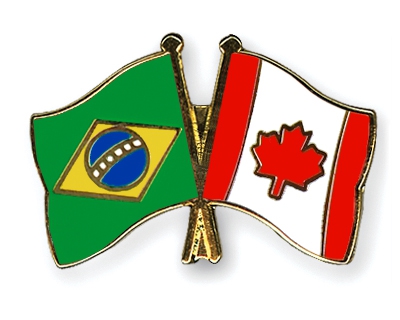Moving from Canada to Brazil will bring a major change in your life. So many things will be dramatically different – from the language and lifestyle to the weather. Planning ahead and giving yourself enough time to prepare for this new adventure is the only way to avoid mistakes and have a stress-free move.

To-do list for moving from Canada to Brazil
Before moving from Canada to Brazil, there are numerous tasks you need to complete. Making a to-do list is a great way to stay organized when moving house. This is approximately what it could look like.
- First and foremost, make sure you have a place to live and work in Brazil, and a school for your children
- Apply for a visa – for permanent relocation you need a permanent visa
- Check all other paperwork requirements for relocation
- Make sure your passport and driver’s license are valid
- Inform your children’s school/kindergarten that you’re leaving
- Book your plane tickets and hotel if needed
- Find reliable movers, ask for an estimate and schedule the move
- Have a medical check-up, get your vaccines
- Do the same with your pet(s)
- If you or your family are taking any medication, make sure to find an equivalent in Brazil or arrange to take a supply with you
- Organize farewell parties
- Take care of any house repairs, if needed
- Change your address where needed
- Cancel your subscriptions to magazines, newspapers, etc.
- Cancel your house insurance, if needed
- Inform all utility departments that you no longer need their services (telephone, gas, electricity, cable TV, etc)
- Make sure there are no unpaid bills left
- Get packing supplies
- Pack for international relocation starting from the least used items
- Pack a separate suitcase with essentials to take with you on the plane
- Get rid of the rest – sell, donate, store…
- Take care of the paperwork with the shipping company, get a delivery date
- Check if ALL documents are in order
- Once again, make sure you haven’t forgotten anything
Customs regulations
Only one air and one sea shipment with items for personal use, such as used furniture, instruments, machines, tools and the like can be taken to Brazil. The shipment has to originate and depart from the country of the shipper’s residence. Furthermore, the shipment has to arrive within six months after your arrival. An inventory containing the serial numbers, brand names and estimated values of your items must be brought. For items that are not part of the inventory, you have to pay high taxes and import duties. After the contract expires, temporary visa holders must re-export their shipment. All visa holders must register at the Brazilian Federal Police. This must be done within thirty days after arrival.
You have to declare firearms on entry and get a license for them. Used cars and motorcycles are not allowed in Brazil. Pets are allowed, as long as they are listed on the original inventory.
Relocation requirements for pets
Domestic pets need a health certificate. The certificate has to be issued by the Brazilian consulate in Canada, no more than four days before relocation. Cats and dogs over three months of age must be vaccinated against rabies between 30 days and 12 months before departure. The Brazilian Consulate General in Canada has to endorse the vaccination. Fortunately, there is no quarantine for pets after moving from Canada to Brazil. After relocation, your pet can receive quality veterinary care and pet supplies in urban parts of Brazil.
Moving from Canada to Brazil with professional movers
Moving overseas is one of the most complicated moves you can imagine. Doing it all by yourself is not only hard but also risky. Therefore, it is extremely important to pick the best movers. Furthermore, you don’t need just any Brazilian movers but international movers Brazil. Only someone with experience in moving overseas can guarantee a trouble-free relocation.

How to find a reliable moving company in Brazil
- Ask friends or family members to recommend a good company for moving from Canada to Brazil.
- Find reviews and recommendations online.
- Visit the companies’ websites.
- Make sure the companies have a license to export and import.
- Narrow your choice and get free, in-home estimates. Never trust online estimates.
- Compare estimates, making sure you’re not overlooking any hidden moving costs.
- Visit the company’s physical address. Do not trust a company without a physical office.
Apart from being reputable and reliable, your movers should offer a range of international moving services, including packing and storage. For example, if you want to scratch one big thing from your to-do list, look for a company that provides packing services.
Canadian expats’ life in Brazil
Learning Portuguese is recommendable
You would be surprised by how few people speak English in Brazil, especially in rural areas. You won’t be able to take care of your daily affairs unless you start learning the official language – Portuguese. The Brazilian variant of Portuguese, to be precise, which has about 204 million native speakers.

Furthermore, speaking Portuguese will help you a lot if you intend to do business in Brazil, especially outside major cities. When conducting business, it is a good idea to find a translator if you’re not fluent in Portuguese. You can also take advantage of your English, since Brazilian companies need more employees who speak both English and Portuguese.
How to communicate in Brazil
Although Portuguese sounds a little like Spanish, it is quite different. So, don’t rely on your Spanish too much. Actually, trying to communicate with them in Spanish might be considered offensive.
Since written communication is less popular than oral, a phone call or a visit should usually follow a written message.

When it comes to oral communication, expats moving from Canada to Brazil might feel that Brazilians are a little too passionate. However, Brazilians will get the wrong impression if you’re overly formal and reserved. Use body language whenever you feel strongly about something if you want people to truly believe you. Eye contact, touch, and proximity to the other person are very important. If you want to appear friendly, don’t avoid these things during communication.
Brazil is cheaper than Canada but still expensive for Brazilians
The cost of living in Brazil is generally lower than that of Canada. Still, Brazil is considered to be quite expensive due to lower household income. If you have a foreign salary, you will probably be able to live comfortably. However, if you’re planning to work for a Brazilian company, your salary is likely to be low. In Brazil, you won’t be able to open a bank account without a residence visa. It is a good idea to find an ATM which doesn’t charge extra for international accounts. In 1984, Canada and Brazil signed a Double Taxation Treaty, which means you won’t be paying Brazilian income tax.

Compared to Canada, housing is much cheaper, whether you rent or buy. Interestingly, domestic help is affordable. In fact, having a maid is very common in Brazil, even among those with lower income.
Education for students moving from Canada to Brazil
When it comes to school education, you have two options – public and private. Although the educational system has a lot of flaws, if you find good schools, your child can receive a great education.
Even though expat students can attend free public schools, most of them go to private schools. However, private education is rather costly. In spite of the high prices, the number of students attending private schools is growing. Why? In public schools, there are not enough teachers, the classrooms are overcrowded, infrastructure and security are not satisfactory, etc. Still, around 80% of students belong to the public school system. When it comes to higher education, the competition for enrollment is fierce. Unfortunately, the number of private universities that provide low-quality education is on the rise, so be cautious.
Accessing the Brazilian healthcare system
Relocating to Brazil brings a few health risks, therefore, you need to take all the necessary precautions. For instance, a vaccine for hepatitis A and B and typhoid fever is a must. A vast portion of the country is covered by tropical jungle, which is why there’s a high risk of malaria and dengue fever.
The public system
Medical insurance for you and your family should be of utmost importance. If you wish to avoid spending a lot of money on private medical services, we recommend the public sector. Healthcare is provided to everyone who is legally in the country, including foreigners. The government provides free public healthcare services for those who are unable to pay – hospitalization and surgery are included.
The private system
The private healthcare system covers 20% of the population. Among its perks are better care and shorter waits. The price depends on the provider, location, and coverage. Those who have private health insurance also have a right to public healthcare.
Alternatively, you can use your current health insurance from your home country if your insurance provider has doctors in Brazil.
Traveling around Brazil
Since the territory of Brazil is huge, the best way to travel between cities is by plane. Nevertheless, the road network is quite convenient. With over 1.6 km of roads, it has the largest road network in South America. The quality of Brazilian roads is usually good. Unlike the coastal area and the populated areas in the south, the roads in the Amazon area are hard or sometimes impossible to use. Before departing on longer trips, check the road conditions, travel distance and travel time. Also, make sure you have a map and gas reserves.
Public transportation
Urban areas offer different forms of public transport. In large cities, finding bus services and stops is easy. On the other hand, there are no designated bus stops in the countryside. Some rural destinations are very hard to reach using public buses. Besides, finding a map of all the bus routes is unlikely.
Driving in Brazil
You can also drive your own car, especially if you’re planning to live in the countryside or go on road trips. You are allowed to drive with your foreign license for up to six months. Although not mandatory, it is recommendable that you carry a translation of your Canadian license. Gas stations can be found everywhere, except for the Amazon area.

Although the traffic rules are similar to those in most countries, the locals don’t always follow them. Be very careful since animals and pedestrians can be seen even on highways. The speed limit is 110 km/h on highways, 60 km/h within cities, 80km/h outside cities, but 40 km/h on rural roads.
Adjusting to a new climate
Moving from Canada to Brazil means living under completely different climatic conditions. The climate in Canada varies from arctic and subarctic in the north to temperate in the south. The Brazilian climate, by contrast, is mainly tropical. A smaller part of Brazil (the southern region) has a subtropical, temperate warm climate. Therefore, you’ll need heating less frequently. In addition, feel free to leave most of your warmest clothes in Canada because you won’t need them. The summer lasts from November to March while the winter lasts from June to August.
Temperature, precipitation, and humidity after moving from Canada to Brazil
Average temperatures, precipitation, and humidity levels vary depending on the region and the season. For example, Recife, Rio de Janeiro, and Salvador generally have high temperatures, while Brasilia and Belo Horizonte enjoy moderate temperatures. Curitiba, Sao Paulo, Florianopolis and Porto Alegre have a subtropical climate. Most parts of Brazil get moderate levels of rainfall. However, the northeast often experiences droughts, while the Amazon region has high levels of humidity and precipitation. The northeast is not only the driest but also the warmest part of the country with frequent temperatures over 38 °C (100 °F). Unlike Canada, Brazil does not get much snow. Snow falls only in higher areas.




 mon ~ fri - 9am ~ 7pm
mon ~ fri - 9am ~ 7pm
